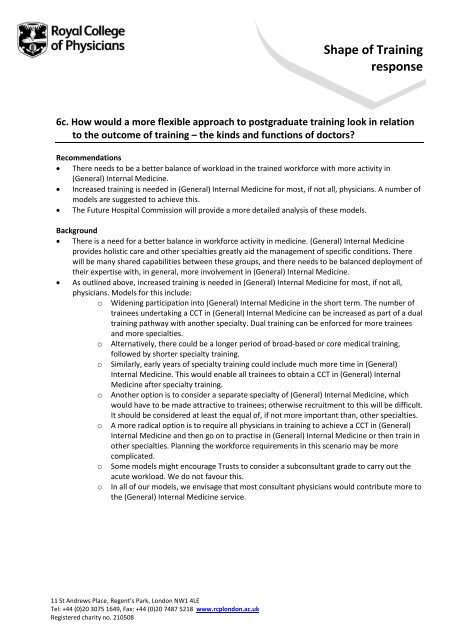Dr Andrew Hilson FRCP - Royal College of Physicians
Dr Andrew Hilson FRCP - Royal College of Physicians
Dr Andrew Hilson FRCP - Royal College of Physicians
Create successful ePaper yourself
Turn your PDF publications into a flip-book with our unique Google optimized e-Paper software.
Shape <strong>of</strong> Trainingresponse6c. How would a more flexible approach to postgraduate training look in relationto the outcome <strong>of</strong> training – the kinds and functions <strong>of</strong> doctors?Recommendations There needs to be a better balance <strong>of</strong> workload in the trained workforce with more activity in(General) Internal Medicine. Increased training is needed in (General) Internal Medicine for most, if not all, physicians. A number <strong>of</strong>models are suggested to achieve this. The Future Hospital Commission will provide a more detailed analysis <strong>of</strong> these models.Background There is a need for a better balance in workforce activity in medicine. (General) Internal Medicineprovides holistic care and other specialties greatly aid the management <strong>of</strong> specific conditions. Therewill be many shared capabilities between these groups, and there needs to be balanced deployment <strong>of</strong>their expertise with, in general, more involvement in (General) Internal Medicine. As outlined above, increased training is needed in (General) Internal Medicine for most, if not all,physicians. Models for this include:o Widening participation into (General) Internal Medicine in the short term. The number <strong>of</strong>trainees undertaking a CCT in (General) Internal Medicine can be increased as part <strong>of</strong> a dualtraining pathway with another specialty. Dual training can be enforced for more traineesand more specialties.o Alternatively, there could be a longer period <strong>of</strong> broad-based or core medical training,followed by shorter specialty training.o Similarly, early years <strong>of</strong> specialty training could include much more time in (General)Internal Medicine. This would enable all trainees to obtain a CCT in (General) InternalMedicine after specialty training.o Another option is to consider a separate specialty <strong>of</strong> (General) Internal Medicine, whichwould have to be made attractive to trainees; otherwise recruitment to this will be difficult.It should be considered at least the equal <strong>of</strong>, if not more important than, other specialties.o A more radical option is to require all physicians in training to achieve a CCT in (General)Internal Medicine and then go on to practise in (General) Internal Medicine or then train inother specialties. Planning the workforce requirements in this scenario may be morecomplicated.o Some models might encourage Trusts to consider a subconsultant grade to carry out theacute workload. We do not favour this.o In all <strong>of</strong> our models, we envisage that most consultant physicians would contribute more tothe (General) Internal Medicine service.11 St <strong>Andrew</strong>s Place, Regent’s Park, London NW1 4LETel: +44 (0)20 3075 1649, Fax: +44 (0)20 7487 5218 www.rcplondon.ac.ukRegistered charity no. 210508

















